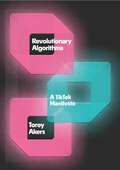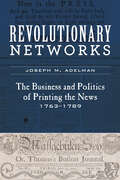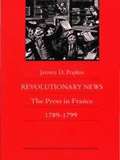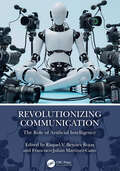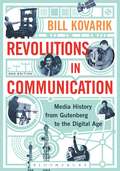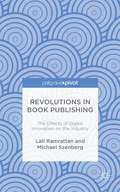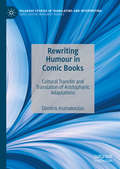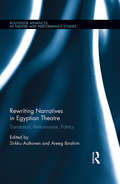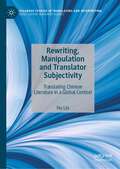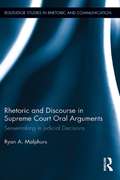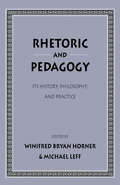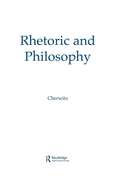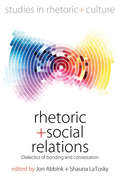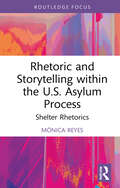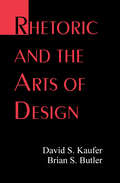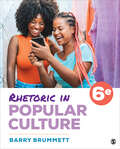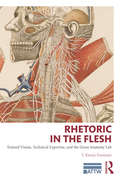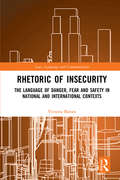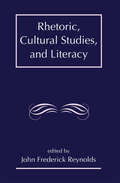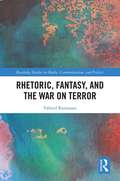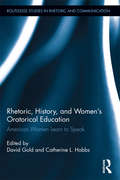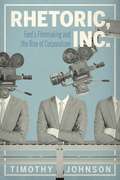- Table View
- List View
Revolutionary Algorithms: A TikTok Manifesto
by Torey AkersFrom an artist and TikTok creator, a critical look at the controversial app and its effect on cultural heritage, artificial intelligence, community organizing, and digital censorship. In Revolutionary Algorithms, Torey Akers approaches TikTok with a deep understanding of the app, as both a prolific creator and consumer of its content. In these essays, she interrogates how the TikTok ban and the multiple genocides happening around the world are deeply intertwined; how the app can empower creators, amplify social movements, and document abuses of power. She addresses the good, bad, and sometimes uncanny parts of maneuvering and communicating in a digital space. As a new era of social media looms, Akers makes the case for techno-progressivism, looking toward a future where TikTok continues to connect, inspire, and create space for more intersectionality, equity, and joy.
Revolutionary Networks: The Business and Politics of Printing the News, 1763–1789 (Studies in Early American Economy and Society from the Library Company of Philadelphia)
by Joseph M. AdelmanAn engrossing and powerful story about the influence of printers, who used their commercial and political connections to directly shape Revolutionary political ideology and mass mobilization.Honorable Mention, St. Louis Mercantile Library Prize, Bibliographical Society of AmericaDuring the American Revolution, printed material, including newspapers, pamphlets, almanacs, and broadsides, played a crucial role as a forum for public debate. In Revolutionary Networks, Joseph M. Adelman argues that printers—artisans who mingled with the elite but labored in a manual trade—used their commercial and political connections to directly shape Revolutionary political ideology and mass mobilization. Going into the printing offices of colonial America to explore how these documents were produced, Adelman shows how printers balanced their own political beliefs and interests alongside the commercial interests of their businesses, the customs of the printing trade, and the prevailing mood of their communities. Adelman describes how these laborers repackaged oral and manuscript compositions into printed works through which political news and opinion circulated. Drawing on a database of 756 printers active during the Revolutionary era, along with a rich collection of archival and printed sources, Adelman surveys printers' editorial strategies. Moving chronologically through the era of the American Revolution and to the war's aftermath, he details the development of the networks of printers and explains how they contributed to the process of creating first a revolution and then the new nation.By underscoring the important and intertwined roles of commercial and political interests in the development of Revolutionary rhetoric, this book essentially reframes our understanding of the American Revolution. Printers, Adelman argues, played a major role as mediators who determined what rhetoric to amplify and where to circulate it. Offering a unique perspective on the American Revolution and early American print culture, Revolutionary Networks reveals how these men and women managed political upheaval through a commercial lens.
Revolutionary News: The Press in France, 1789–1799
by Jeremy PopkinThe newspaper press was an essential aspect of the political culture of the French Revolution. Revolutionary News highlights the most significant features of this press in clear and vivid language. It breaks new ground in examining not only the famous journalists but the obscure publishers and the anonymous readers of the Revolutionary newspapers. Popkin examines the way press reporting affected Revolutionary crises and the way in which radical journalists like Marat and the Pere Duchene used their papers to promote democracy.
Revolutionizing Communication: The Role of Artificial Intelligence
by Benítez Rojas, Raquel V. Martínez-Cano, Francisco-JuliánRevolutionizing Communication: The Role of Artificial Intelligence explores the wide-ranging effects of artificial intelligence (AI) on how we connect and communicate, changing social interactions, relationships, and the very structure of our society. Through insightful analysis, practical examples, and knowledgeable perspectives, the book examines chatbots, virtual assistants, natural language processing, and more. It shows how these technologies have a significant impact on cultural productions, business, education, ethics, advertising, media, journalism, and interpersonal interactions.Revolutionizing Communication is a guide to comprehending the present and future of communication in the era of AI. It provides invaluable insights for professionals, academics, and everyone interested in the significant changes occurring in our digital age.
Revolutions In Communication: Media History From Gutenberg To The Digital Age
by Bill KovarikRevolutions in Communication offers a new approach to media history, presenting an encyclopedic look at the way technological change has linked social and ideological communities. Using key figures in history to benchmark the chronology of technical innovation, Kovarik's exhaustive scholarship narrates the story of revolutions in printing, electronic communication and digital information, while drawing parallels between the past and present. Updated to reflect new research that has surfaced these past few years, Revolutions in Communication continues to provide students and teachers with the most readable history of communications, while including enough international perspective to get the most accurate sense of the field. The supplemental reading materials on the companion website include slideshows, podcasts and video demonstration plans in order to facilitate further reading.
Revolutions in Book Publishing: The Effects Of Digital Innovation On The Industry
by Michael Szenberg Lall RamrattanRevolutions in Book Publishing: The Effects of Digital Innovation on the Industry
by Michael Szenberg Lall RamrattanRevolutions in Book Publishing uses dynamic methods to examine the evolution of the industry's transition from physical place to cyber space, analyzing the latest effects of technological innovations on the industry as well as their influence on distribution channels, market structure, and conduct of the industry.
Rewriting Humour in Comic Books: Cultural Transfer and Translation of Aristophanic Adaptations (Palgrave Studies in Translating and Interpreting)
by Dimitris AsimakoulasThis book examines comic book adaptations of Aristophanes’ plays in order to shed light on how and why humour travels across cultures and time. Forging links between modern languages, translation and the study of comics, it analyses the Greek originals and their English translations and offers a unique, language-led research agenda for cultural flows, and the systematic analysis of textual norms in a multimodal environment. It will appeal to students and scholars of Modern Languages, Translation Studies, Comics Studies, Cultural Studies and Comparative Literature.
Rewriting Narratives in Egyptian Theatre: Translation, Performance, Politics (Routledge Advances in Theatre & Performance Studies)
by Sirkku Aaltonen Areeg IbrahimThis study of Egyptian theatre and its narrative construction explores the ways representations of Egypt are created of and within theatrical means, from the 19th century to the present day. Essays address the narratives that structure theatrical, textual, and performative representations and the ways the rewriting process has varied in different contexts and at different times. Drawing on concepts from Theatre and Performance Studies, Translation Studies, Cultural Studies, Postcolonial Studies, and Diaspora Studies, scholars and practitioners from Egypt and the West enter into dialogue with one another, expanding understanding of the different fields. The articles focus on the ways theatre texts and performances change (are rewritten) when crossing borders between different worlds. The concept of rewriting is seen to include translation, transformation, and reconstruction, and the different borders may be cultural and national, between languages and dramaturgies, or borders that are present in people’s everyday lives. Essays consider how rewritings and performances cross borders from one culture, nation, country, and language to another. They also study the process of rewriting, the resulting representations of foreign plays on stage, and representations of the Egyptian revolution on stage and in Tahrir Square. This assessment of the relationship between theatre practices, exchanges, and rewritings in Egyptian theatre brings vital coverage to an undervisited area and will be of interest to developments in theatre translation and beyond.
Rewriting, Manipulation and Translator Subjectivity: Translating Chinese Literature in a Global Context (Palgrave Studies in Translating and Interpreting)
by Hu LiuThis book presents an in-depth analysis of Howard Goldblatt’s translation of Mo Yan’s Life and Death Are Wearing Me Out (L&D). It explores how Goldblatt translates the original novel under the influence of three major manipulative powers: poetics, ideology and patronage, as well as his own subjectivity (translator subjectivity), to achieve his objectives as a literary translator. The author analyses both the translation and its paratext to gain a more complete understanding of Goldblatt’s accomplishments, and examines how Goldblatt rewrites the original text under the influence of various patronage factors, such as the original author, publisher, editor, market expectancy, literary collaborator, and the target reader. This book provides a comprehensive picture of the production, reception and dissemination of Goldblatt’s translation, exposing the motivations behind his translation in full measure, and it will be of interest to students and scholars of Translation Studies, Comparative Literature and Literary Studies, and Chinese Culture and Literature.
Rhetoric and Discourse in Supreme Court Oral Arguments: Sensemaking in Judicial Decisions (Routledge Studies in Rhetoric and Communication)
by Ryan MalphursWhile legal scholars, psychologists, and political scientists commonly voice their skepticism over the influence oral arguments have on the Court’s voting pattern, this book offers a contrarian position focused on close scrutiny of the justices’ communication within oral arguments. Malphurs examines the rhetoric, discourse, and subsequent decision-making within the oral arguments for significant Supreme Court cases, visiting their potential power and danger and revealing the rich dynamic nature of the justices’ interactions among themselves and the advocates. In addition to offering advancements in scholars’ understanding of oral arguments, this study introduces Sensemaking as an alternative to rational decision-making in Supreme Court arguments, suggesting a new model of judicial decision-making to account for the communication within oral arguments that underscores a glaring irony surrounding the bulk of related research—the willingness of scholars to criticize oral arguments but their unwillingness to study this communication. With the growing accessibility of the Court’s oral arguments and the inevitable introduction of television cameras in the courtroom, this book offers new theoretical and methodological perspectives at a time when scholars across the fields of communication, law, psychology, and political science will direct even greater attention and scrutiny toward the Supreme Court.
Rhetoric and Pedagogy: Its History, Philosophy, and Practice: Essays in Honor of James J. Murphy (Rhetoric And Public Affairs Ser.)
by Winifred Bryan Horner Michael LeffTo provide a view of the history of western rhetoric, this volume presents original articles by a number of world-renowned scholars representing different countries and varying viewpoints. In discussing the status of the historical perspectives on rhetoric, these international scholars also present a tribute to James J. Murphy, whose scholarship and service did much to shape the field. The book will introduce new insights into western European rhetoric and its connections with English rhetoric.
Rhetoric and Philosophy
by Richard A. CherwitzThis important volume explores alternative ways in which those involved in the field of speech communication have attempted to find a philosophical grounding for rhetoric. Recognizing that rhetoric can be supported in a wide variety of ways, this text examines eight different philosophies of rhetoric: realism, relativism, rationalism, idealism, materialism, existentialism, deconstructionism, and pragmatism. The value of this book lies in its pluralistic and comparative approach to rhetorical theory. Although rhetoric may be the more difficult road to philosophy, the fact that it is being traversed by a group of authors largely from speech communication demonstrates important growth in this field. Ultimately, there is recognition that if different thinkers can have solid reasons to adhere to disparate philosophies, serious communication problems can be eliminated. Rhetoric and Philosophy will assist scholars in choosing from among the many philosphical starting places for rhetoric.
Rhetoric and Social Relations: Dialectics of Bonding and Contestation (Studies in Rhetoric and Culture #8)
by Jon Abbink Shauna LaToskyThis volume explores the constitutive role of rhetoric in socio-cultural relations, where discursive persuasion is so important, and contains both theoretical chapters as well as fascinating examples of the ambiguities and effects of rhetoric used (un)consciously in social praxis. The elements of power, competition and political persuasion figure prominently. It is an accessible collection of studies, speaking to common issues and problems in social life, and shows the heuristic and often explanatory value of the rhetorical perspective.
Rhetoric and Storytelling within the U.S. Asylum Process: Shelter Rhetorics (Routledge Studies in Rhetoric and Communication)
by Mónica ReyesThis book explores the U.S. asylum process and how those seeking shelter deal with the rhetorical pressures of compelling asylum narratives they need to write in order to stay.Centered around a study conducted at a shelter on the U.S. border, this book moves beyond this context to demonstrate how liminal sites provide opportunities for displaced communities to employ distinct shared rhetorical practices of daily life—like silence and routine—that both safeguard vulnerabilities and enact agency for individuals within precarious spaces. Placing people who seek asylum and those who work with them as rhetorical and socio-cultural experts on this issue, the study adds to the emerging importance of rhetoric within discussions of asylum and forced migration and demonstrates the significance of rhetorical ecology theory as part of a blended methodology in understanding people seeking asylum as a group in a perpetual and explicit state of ethos development.Highlighting the need for support which is sensitive to the narrative struggles people seeking asylum face, this book will have important findings for scholars and upper-level students of cultural rhetorics, feminist rhetoric, migration studies, political science, and intercultural communication.
Rhetoric and the Arts of Design
by David S. Kaufer Brian S. ButlerThe design arts -- from the design of buildings and machines to software and interfaces -- are associated with types of knowledge and performance thought to be structured, modular, and systematic. Such arts have become increasingly prestigious in our technocratic society. Since Aristotle, the art of rhetoric was conceived as a loosely structured "practical" art thought to be limited in the extent to which it could mimic more precise subject matters. The art of rhetoric has been controversial since classical times, but its status has sunk even lower since the industrial revolution -- a point when civic cultures began to cede authority and control to the cultures of specialized experts. Many sympathizers of rhetoric have resisted its decline by calling for a civic art of public discourse to stand in opposition to a technocratic specialized discourse that has come, increasingly, to disenfranchise the ordinary citizen. This is the first book to question the rhetoric/technical knowledge split from a more fundamental perspective. To get some perspective on what is at stake in rhetoric's traditional classification as a "practical" art, the authors: * explore the distinction between practical and design arts; * enumerate the various criteria cited in the literature for qualifying a cluster of knowledge and performative skills to count as an art of design; * show how the knowledge and performative skills associated with the art of rhetoric meet the major requirements of design knowledge; * propose a general architecture of rhetorical design, one descriptive both of civic address and specialized academic argument; * turn to the Lincoln/Douglas debates to embody and provide some empirical support and illustration for their architecture; * demonstrate how Lincoln and Douglas can be thought of as expert designers whose rhetoric is highly structured and modular; and * explain how the rhetoric of both rhetorical agents can be represented in the layers and modules that one needs to display plans for buildings, software, or other design artifacts. These layers and modules are not just post hoc annotations of the debates; they also illuminate new and systematic ways for viewing the debates -- and by implication, other specimens of rhetoric -- in terms of strategies of artistic production. Kaufer and Butler conclude their presentation by citing some of the research and educational implications that follow from housing rhetoric within the family of design arts.
Rhetoric in Popular Culture
by Barry S. BrummettThe Sixth Edition of Barry Brummett’s Rhetoric in Popular Culture provides readers with in-depth insight into the techniques of rhetorical criticism to analyze the full spectrum of contemporary issues in popular culture. Exploring a wide range of mass media texts including advertisements, magazines, movies, television, popular music, and social media, Barry Brummett presents key rhetorical concepts and applies them with critical analysis to a variety of exciting examples drawn from today′s popular culture. Ideal for courses in rhetorical criticism, the new edition includes new and updated sample critical essays and case studies that demonstrate for readers how the critical methods discussed can be used to study the hidden rhetoric of popular culture.
Rhetoric in Popular Culture
by Barry S. BrummettThe Sixth Edition of Barry Brummett’s Rhetoric in Popular Culture provides readers with in-depth insight into the techniques of rhetorical criticism to analyze the full spectrum of contemporary issues in popular culture. Exploring a wide range of mass media texts including advertisements, magazines, movies, television, popular music, and social media, Barry Brummett presents key rhetorical concepts and applies them with critical analysis to a variety of exciting examples drawn from today′s popular culture. Ideal for courses in rhetorical criticism, the new edition includes new and updated sample critical essays and case studies that demonstrate for readers how the critical methods discussed can be used to study the hidden rhetoric of popular culture.
Rhetoric in the Flesh: Trained Vision, Technical Expertise, and the Gross Anatomy Lab (ATTW Series in Technical and Professional Communication)
by T. Kenny FountainRhetoric in the Flesh is the first book-length ethnographic study of the gross anatomy lab to explain how rhetorical discourses, multimodal displays, and embodied practices facilitate learning and technical expertise and how they shape participants’ perceptions of the human body. By investigating the role that discourses, displays, and human bodies play in the training and socialization of medical students, T. Kenny Fountain contributes to our theoretical and practical understanding of the social factors that make rhetoric possible and material in technical domains. Thus, the book also explains how these displays, discourses, and practices lead to the trained perspective necessary for expertise. This trained vision is constructed over time through what Fountain terms embodied rhetorical action, an intertwining of body-object-environment that undergirds all scientific, medical, and technical work. This book will be valuable for graduate and advanced undergraduate courses in technical and professional communication (technical communication theory and practice, visual or multimodal communication, medical technical communication) and rhetorical studies, including visual rhetoric, rhetoric of science, medical rhetoric, material rhetoric and embodiment, and ethnographic approaches to rhetoric.
Rhetoric of InSecurity: The Language of Danger, Fear and Safety in National and International Contexts (Law, Language and Communication)
by Victoria BainesThis book demands that we question what we are told about security, using tools we have had for thousands of years. The work considers the history of security rhetoric in a number of distinct but related contexts, including the United States’ security strategy, the "war" on Big Tech, and current concerns such as cybersecurity. Focusing on the language of security discourse, it draws common threads from the ancient world to the present day and the near future. The book grounds recent comparisons of Donald Trump to the Emperor Nero in a linguistic evidence base. It examines the potential impact on society of policy-makers’ emphasis on the novelty of cybercrime, their likening of the internet to the Wild West, and their claims that criminals have "gone dark". It questions governments’ descriptions of technology companies in words normally reserved for terrorists, and asks who might benefit. Interdisciplinary in approach, the book builds on existing literature in the Humanities and Social Sciences, most notably studies on rhetoric in Greco-Roman texts, and on the articulation of security concerns in law, international relations, and public policy contexts. It adds value to this body of research by offering new points of comparison, and a fresh but tried and tested way of looking at problems that are often presented as unprecedented. It will be essential to legal and policy practitioners, students of Law, Politics, Media, and Classics, and all those interested in employing critical thinking.
Rhetoric, Cultural Studies, and Literacy: Selected Papers From the 1994 Conference of the Rhetoric Society of America
by John Frederick ReynoldsThis volume presents a representative cross-section of the more than 200 papers presented at the 1994 conference of the Rhetoric Society of America. The contributors reflect multi- and inter-disciplinary perspectives -- English, speech communication, philosophy, rhetoric, composition studies, comparative literature, and film and media studies. Exploring the historical relationships and changing relationships between rhetoric, cultural studies, and literacy in the United States, this text seeks answers to such questions as what constitutes "literacy" in a post-modern, high-tech, multi-cultural society?
Rhetoric, Fantasy, and the War on Terror (Routledge Studies in Media, Communication, and Politics)
by Vaheed RamazaniThe book draws on psychoanalytic and semiotic perspectives to examine popular, political, legal, and journalistic discourses mediating the War on Terror. The analysis encompasses governmental speeches, legal documents, print and broadcast journalism, and military memoirs under the Bush, Obama, and Trump administrations. Dominant motifs include American exceptionalism and its historical affinity for war, the synergy between the technologies of war and media, the role of the "military-industrial-media-entertainment network" in promoting the American culture of militarism, the dialectic of identification and repulsion in the construction of "the enemy," and the political and mediatic normalization of fear. The author explores in particular the role of desire in the rhetorical construction and naturalization of the fantasy of a global War on Terror. Scholars and students alike will take interest in this original contribution to the fields of cultural studies, psychoanalysis, media studies, rhetoric, critical international relations, and international humanitarian law and ethics.
Rhetoric, History, and Women's Oratorical Education: American Women Learn to Speak (Routledge Studies in Rhetoric and Communication)
by David Gold Catherine L. HobbsHistorians of rhetoric have long worked to recover women's education in reading and writing, but have only recently begun to explore women's speaking practices, from the parlor to the platform to the varied types of institutions where women learned elocutionary and oratorical skills in preparation for professional and public life. This book fills an important gap in the history of rhetoric and suggests new paths for the way histories may be told in the future, tracing the shifting arc of women's oratorical training as it develops from forms of eighteenth-century rhetoric into institutional and extrainstitutional settings at the end of the nineteenth century and diverges into several distinct streams of community-embodied theory and practice in the twentieth. Treating key rhetors, genres, settings, and movements from the early republic to the present, these essays collectively challenge and complicate many previous claims made about the stability and development of gendered public and private spheres, the decline of oratorical culture and the limits of women's oratorical forms such as elocution and parlor rhetorics, and women's responses to rhetorical constraints on their public speaking. Enriching our understanding of women's oratorical education and practice, this cutting-edge work makes an important contribution to scholarship in rhetoric and communication.
Rhetoric, Inc.: Ford’s Filmmaking and the Rise of Corporatism (RSA Series in Transdisciplinary Rhetoric #15)
by Timothy JohnsonIn 1914, the Ford Motor Company opened its Motion Picture Laboratory, an in-house operation that produced motion pictures to educate its workforce and promote its products. Just six years later, Ford films had found their way into schools and newsreels, travelogues, and even feature films in theaters across the country. By 1961, it is estimated that the company’s movies had captured an audience of sixty-four million people.This study of Ford’s corporate film program traces its growth and rise in prominence in corporate America. Drawing on nearly three hundred hours of material produced between 1914 and 1954, Timothy Johnson chronicles the history of Ford’s filmmaking campaign and analyzes selected films, visual and narrative techniques, and genres. He shows how what began as a narrow educational initiative grew into a global marketing strategy that presented a vision not just of Ford or corporate culture but of American life more broadly. In these films, Johnson uncovers a powerful rhetoric that Ford used to influence American labor, corporate style, production practices, road building, suburbanization, and consumer culture. The company’s early and continued success led other corporations to adopt similar programs.Persuasive and thoroughly researched, Rhetoric, Inc. documents the role that imagery and messaging played in the formation of the modern American corporation and provides a glimpse into the cultural turn to the economy as a source of entertainment, value, and meaning.
Rhetoric, Inc.: Ford’s Filmmaking and the Rise of Corporatism (RSA Series in Transdisciplinary Rhetoric #15)
by Timothy JohnsonIn 1914, the Ford Motor Company opened its Motion Picture Laboratory, an in-house operation that produced motion pictures to educate its workforce and promote its products. Just six years later, Ford films had found their way into schools and newsreels, travelogues, and even feature films in theaters across the country. It is estimated that by 1961, the company’s movies had captured an audience of sixty-four million people.This study of Ford’s corporate film program traces its growth and rise in prominence in corporate America. Drawing on nearly three hundred hours of material produced between 1914 and 1954, Timothy Johnson chronicles the history of Ford’s filmmaking campaign and analyzes selected films, visual and narrative techniques, and genres. He shows how what began as a narrow educational initiative grew into a global marketing strategy that presented a vision not just of Ford or corporate culture but of American life more broadly. In these films, Johnson uncovers a powerful rhetoric that Ford used to influence American labor, corporate style, production practices, road building, suburbanization, and consumer culture. The company’s early and continued success led other corporations to adopt similar programs.Persuasive and thoroughly researched, Rhetoric, Inc. documents the role that imagery and messaging played in the formation of the modern American corporation and provides a glimpse into the cultural turn to the economy as a source of entertainment, value, and meaning.
